- Home
- FPMT Homepage
Foundation for the Preservation of the Mahayana Tradition
The FPMT is an organization devoted to preserving and spreading Mahayana Buddhism worldwide by creating opportunities to listen, reflect, meditate, practice and actualize the unmistaken teachings of the Buddha and based on that experience spreading the Dharma to sentient beings. We provide integrated education through which people’s minds and hearts can be transformed into their highest potential for the benefit of others, inspired by an attitude of universal responsibility and service. We are committed to creating harmonious environments and helping all beings develop their full potential of infinite wisdom and compassion. Our organization is based on the Buddhist tradition of Lama Tsongkhapa of Tibet as taught to us by our founders Lama Thubten Yeshe and Lama Thubten Zopa Rinpoche.
- Willkommen
Die Stiftung zur Erhaltung der Mahayana Tradition (FPMT) ist eine Organisation, die sich weltweit für die Erhaltung und Verbreitung des Mahayana-Buddhismus einsetzt, indem sie Möglichkeiten schafft, den makellosen Lehren des Buddha zuzuhören, über sie zur reflektieren und zu meditieren und auf der Grundlage dieser Erfahrung das Dharma unter den Lebewesen zu verbreiten.
Wir bieten integrierte Schulungswege an, durch denen der Geist und das Herz der Menschen in ihr höchstes Potential verwandelt werden zum Wohl der anderen – inspiriert durch eine Haltung der universellen Verantwortung und dem Wunsch zu dienen. Wir haben uns verpflichtet, harmonische Umgebungen zu schaffen und allen Wesen zu helfen, ihr volles Potenzial unendlicher Weisheit und grenzenlosen Mitgefühls zu verwirklichen.
Unsere Organisation basiert auf der buddhistischen Tradition von Lama Tsongkhapa von Tibet, so wie sie uns von unseren Gründern Lama Thubten Yeshe und Lama Thubten Zopa Rinpoche gelehrt wird.
- Bienvenidos
La Fundación para la preservación de la tradición Mahayana (FPMT) es una organización que se dedica a preservar y difundir el budismo Mahayana en todo el mundo, creando oportunidades para escuchar, reflexionar, meditar, practicar y actualizar las enseñanzas inconfundibles de Buda y en base a esa experiencia difundir el Dharma a los seres.
Proporcionamos una educación integrada a través de la cual las mentes y los corazones de las personas se pueden transformar en su mayor potencial para el beneficio de los demás, inspirados por una actitud de responsabilidad y servicio universales. Estamos comprometidos a crear ambientes armoniosos y ayudar a todos los seres a desarrollar todo su potencial de infinita sabiduría y compasión.
Nuestra organización se basa en la tradición budista de Lama Tsongkhapa del Tíbet como nos lo enseñaron nuestros fundadores Lama Thubten Yeshe y Lama Zopa Rinpoche.
A continuación puede ver una lista de los centros y sus páginas web en su lengua preferida.
- Bienvenue
L’organisation de la FPMT a pour vocation la préservation et la diffusion du bouddhisme du mahayana dans le monde entier. Elle offre l’opportunité d’écouter, de réfléchir, de méditer, de pratiquer et de réaliser les enseignements excellents du Bouddha, pour ensuite transmettre le Dharma à tous les êtres. Nous proposons une formation intégrée grâce à laquelle le cœur et l’esprit de chacun peuvent accomplir leur potentiel le plus élevé pour le bien d’autrui, inspirés par le sens du service et une responsabilité universelle. Nous nous engageons à créer un environnement harmonieux et à aider tous les êtres à épanouir leur potentiel illimité de compassion et de sagesse. Notre organisation s’appuie sur la tradition guéloukpa de Lama Tsongkhapa du Tibet, telle qu’elle a été enseignée par nos fondateurs Lama Thoubtèn Yéshé et Lama Zopa Rinpoché.
Visitez le site de notre Editions Mahayana pour les traductions, conseils et nouvelles du Bureau international en français.
Voici une liste de centres et de leurs sites dans votre langue préférée
- Benvenuto
L’FPMT è un organizzazione il cui scopo è preservare e diffondere il Buddhismo Mahayana nel mondo, creando occasioni di ascolto, riflessione, meditazione e pratica dei perfetti insegnamenti del Buddha, al fine di attualizzare e diffondere il Dharma fra tutti gli esseri senzienti.
Offriamo un’educazione integrata, che può trasformare la mente e i cuori delle persone nel loro massimo potenziale, per il beneficio di tutti gli esseri, ispirati da un’attitudine di responsabilità universale e di servizio.
Il nostro obiettivo è quello di creare contesti armoniosi e aiutare tutti gli esseri a sviluppare in modo completo le proprie potenzialità di infinita saggezza e compassione.
La nostra organizzazione si basa sulla tradizione buddhista di Lama Tsongkhapa del Tibet, così come ci è stata insegnata dai nostri fondatori Lama Thubten Yeshe e Lama Zopa Rinpoche.
Di seguito potete trovare un elenco dei centri e dei loro siti nella lingua da voi prescelta.
- 欢迎 / 歡迎
简体中文
“护持大乘法脉基金会”( 英文简称:FPMT。全名:Foundation for the Preservation of the Mahayana Tradition) 是一个致力于护持和弘扬大乘佛法的国际佛教组织。我们提供听闻,思维,禅修,修行和实证佛陀无误教法的机会,以便让一切众生都能够享受佛法的指引和滋润。
我们全力创造和谐融洽的环境, 为人们提供解行并重的完整佛法教育,以便启发内在的环宇悲心及责任心,并开发内心所蕴藏的巨大潜能 — 无限的智慧与悲心 — 以便利益和服务一切有情。
FPMT的创办人是图腾耶喜喇嘛和喇嘛梭巴仁波切。我们所修习的是由两位上师所教导的,西藏喀巴大师的佛法传承。
繁體中文
護持大乘法脈基金會”( 英文簡稱:FPMT。全名:Found
ation for the Preservation of the Mahayana Tradition ) 是一個致力於護持和弘揚大乘佛法的國際佛教組織。我們提供聽聞, 思維,禪修,修行和實證佛陀無誤教法的機會,以便讓一切眾生都能 夠享受佛法的指引和滋潤。 我們全力創造和諧融洽的環境,
為人們提供解行並重的完整佛法教育,以便啟發內在的環宇悲心及責 任心,並開發內心所蘊藏的巨大潛能 — 無限的智慧與悲心 – – 以便利益和服務一切有情。 FPMT的創辦人是圖騰耶喜喇嘛和喇嘛梭巴仁波切。
我們所修習的是由兩位上師所教導的,西藏喀巴大師的佛法傳承。 察看道场信息:
- FPMT Homepage
- News/Media
-
- Study & Practice
-
-
- About FPMT Education Services
- Latest News
- Programs
- New to Buddhism?
- Buddhist Mind Science: Activating Your Potential
- Heart Advice for Death and Dying
- Discovering Buddhism
- Living in the Path
- Exploring Buddhism
- FPMT Basic Program
- FPMT Masters Program
- FPMT In-Depth Meditation Training
- Maitripa College
- Lotsawa Rinchen Zangpo Translator Program
- Universal Education for Compassion & Wisdom
- Online Learning Center
-
- Prayers & Practice Materials
- Overview of Prayers & Practices
- Full Catalogue of Prayers & Practice Materials
- Explore Popular Topics
- Benefiting Animals
- Chenrezig Resources
- Death & Dying Resources
- Lama Chopa (Guru Puja)
- Lama Zopa Rinpoche: Compendium of Precious Instructions
- Lama Zopa Rinpoche: Life Practice Advice
- Lama Zopa Rinpoche Practice Series
- Lamrim Resources
- Mantras
- Prayer Book Updates
- Purification Practices
- Sutras
- Thought Transformation (Lojong)
- Audio Materials
- Dharma Dates - Tibetan Calendar
- Translation Services
- Publishing Services
- Ways to Offer Support
- Prayers & Practice Materials
-
- Teachings and Advice
- Find Teachings and Advice
- Lama Zopa Rinpoche Advice Page
- Lama Zopa Rinpoche: Compendium of Precious Instructions
- Lama Zopa Rinpoche Video Teachings
- ༧སྐྱབས་རྗེ་བཟོད་པ་རིན་པོ་ཆེ་མཆོག་ནས་སྩལ་བའི་བཀའ་སློབ་བརྙན་འཕྲིན།
- Podcasts
- Lama Yeshe Wisdom Archive
- Buddhism FAQ
- Dharma for Young People
- Resources on Holy Objects
- Teachings and Advice
-
-
*If a menu item has a submenu clicking once will expand the menu clicking twice will open the page.
-
-
- Centers
-
- Teachers
-
- Projects
-
-
-
-
*If a menu item has a submenu clicking once will expand the menu clicking twice will open the page.
-
-
- FPMT
-
- Shop
-
-
-
The Foundation Store is FPMT’s online shop and features a vast selection of Buddhist study and practice materials written or recommended by our lineage gurus. These items include homestudy programs, prayers and practices in PDF or eBook format, materials for children, and other resources to support practitioners.
Items displayed in the shop are made available for Dharma practice and educational purposes, and never for the purpose of profiting from their sale. Please read FPMT Foundation Store Policy Regarding Dharma Items for more information.
-
-
11
International Mahayana Institute is 50!
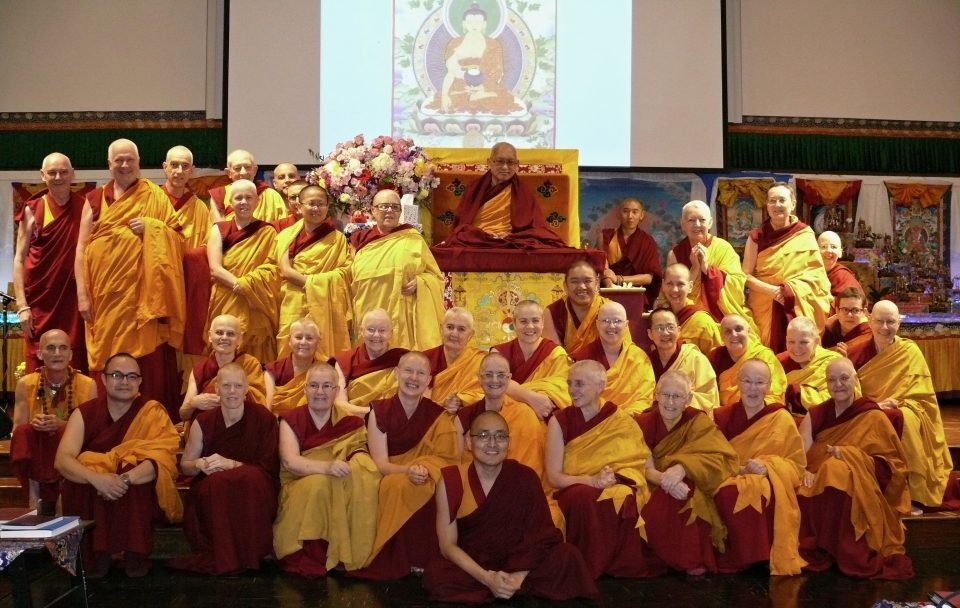
Lama Zopa Rinpoche with IMI Sangha at Light of the Path Retreat, 2017. Photo by Kalleen Mortensen
We congratulate the International Mahayana Institute (IMI) on its 50 years of existence helping FPMT Sangha! The IMI is an FPMT project, established to serve the community of FPMT students who are living in the monk’s or nun’s ordination vows. IMI Director, Ven. Tendar prepared this inspiring report on the history of IMI and a current review, which we share with great rejoicing!
December 15 Celebration
On December 15, 1973 Lama Yeshe created the IMI, an organization for the monks and nuns of the Foundation for the Preservation of the Mahayana Tradition (FPMT). This was Lama’s talk on that day, now included in the book, Advice for Monks and Nuns.
This year, on December 15, the IMI will celebrate this occasion early in the day with a live teaching on YouTube of Khenrinpoche Geshe Chonyi from Kopan and later in the day with Nick Ribush, who was among the ones who witnessed the start of the IMI. In this way the early teachings will be convenient for those in Australia, Asia, and Europe and for night owls in North America. The later teaching will be organized in the day time for North Americans and evening time for Europeans and Asians.
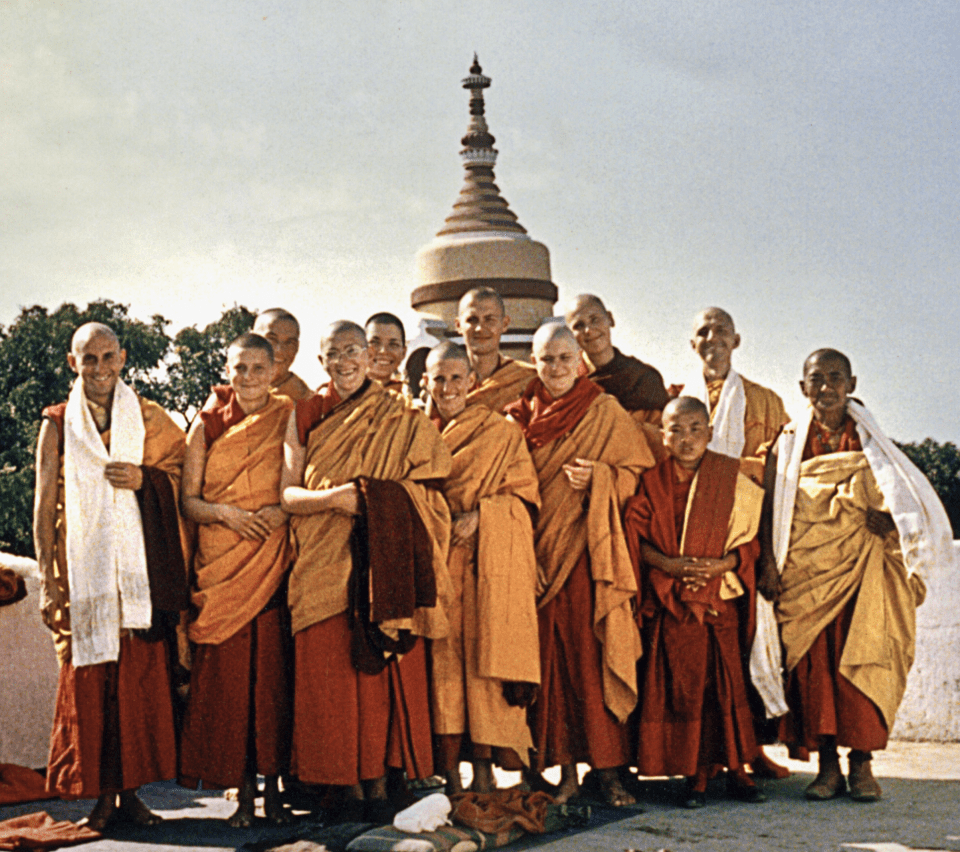
Bodhgaya January 14, 1974. The first IMI group photo, after ordination. (Lama Zopa Rinpoche’s mother, far right, was also ordained on this day.)
History
Around the time of the fifth Kopan meditation course, in November 1973, ten Western Dharma students had requested Lama Yeshe’s permission to get ordained. Lama suggested that they take their ordinations the following January, in Bodhgaya, after His Holiness the Dalai Lama had given the Kalachakra initiation. In December 1973, Lama gathered into his room these ten prospective monks and nuns, together with five or six of his students who had already been ordained.
One of the main messages Lama Yeshe gave was:
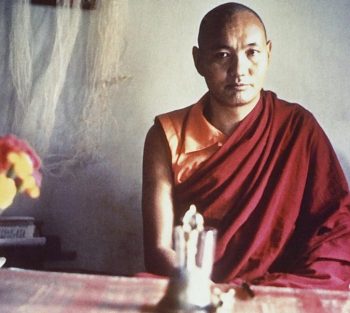
Portrait of Lama Yeshe, Kopan Monastery, Nepal, 1974. Photo courtesy of Lama Yeshe Wisdom Archive.
“My feeling is that it would be much better if the Sangha were to stay together, communicating with each other, rather than people getting ordained and then going off on their own. If you do go off on your own, worldly conditions will make your life difficult; it will be much harder for you to practice Dharma.
“For example, when Sangha members are here at Kopan, we help them lead a monastic life. There are always lamas present, and as a result, our students get some kind of energy that helps them control their minds so that it is easy for them to keep their ordination. If, instead, they run off and stay in some other place where there are not such good conditions, their lives become very difficult. If, on top of that, they get sick, the coming together of internal and external problems makes their lives even more difficult.
“As you know, just because you’re a monk or nun does not mean that you’ve reached enlightenment. It simply means that you have gained an understanding of the nature of samsara and have decided to work continuously to develop within yourself the everlasting, peaceful path of liberation. That’s all. Getting ordained doesn’t give you immediate control over your mind; it doesn’t mean you are completely liberated. It’s not like that.
“Our minds are uncontrolled. We need to control them. Monastic life allows us to develop our minds in a very comfortable way until we have truly achieved complete control over them and have gained such great knowledge-wisdom that even should we go to some berserk place, we are able to control that berserk energy instead of it controlling us.”
Lama Yeshe continued giving lots of advice on what renunciation really means, on respect, on the conditions which are important (and like paper should stay away from fire, sangha should stay away from situations which potentially break their vows) and the advantages of monastic life.
He concluded: ‘’Now that I’ve expressed my feelings, you should discuss among yourselves how to create strong Sangha togetherness. It doesn’t matter to me where you live, as long as you maintain strong Sangha togetherness. You should create those kinds of conditions. Think with wisdom, and be strong.”
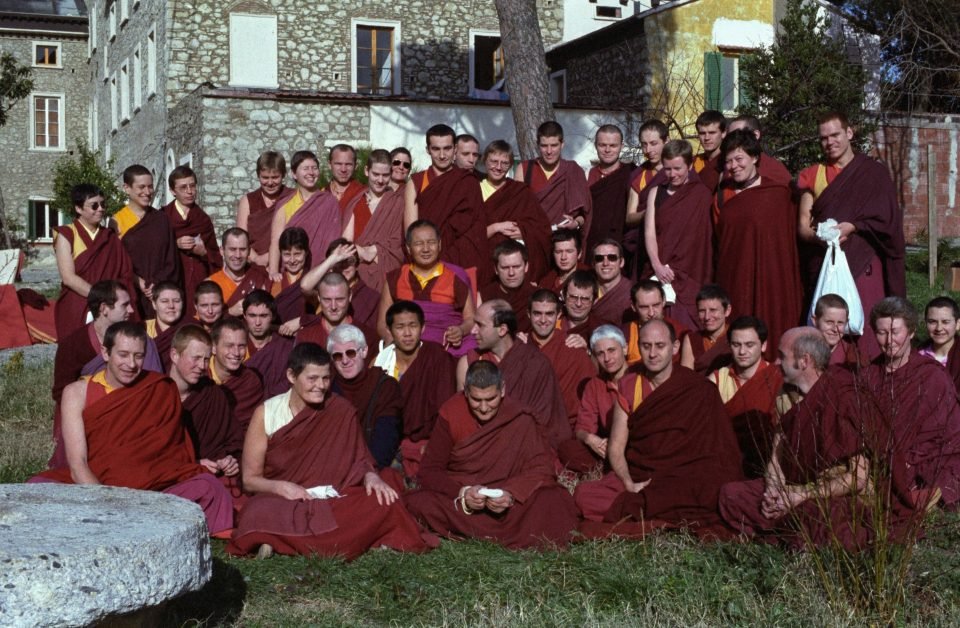
IMI group at Istituto Lama Tzong Khapa with Lama Yeshe after Six Yogas of Naropa teachings, 1982–83. Photo courtesy of Lama Yeshe Wisdom Archive.
Goals and Mission Statement of the IMI
The guiding vision of the International Mahayana Institute is to provide people all over the world who want to practice the Buddhist path as a monk or nun with places to be and ways to do that. That means to secure conducive conditions for its family of monks and nuns, its members. The basics should be met: having food, shelter, medicine and education.
IMI’s Mission Statement says: ‘The IMI is an FPMT Sangha specific community that serves sentient beings, and is empowered to respond to, and take care of the needs of its family of monks and nuns through the development of quality Sangha training programs, harmonious monastic communities, effective communications, financial support, and advocacy. The IMI is established for ordained sangha within the FPMT who are not part of monasteries and support systems in traditional Buddhist cultures.
As emissaries of Buddhism (teachers, spiritual caregivers, ritual practitioners, meditators, retreat leaders), IMI members inspire others through their speech and behavior and provide the opportunity for lay practitioners to integrate respect and support for Sangha into their practice of Buddhism’.
A Short Review
We are fifty years further along, and monastic institutions have been established in Nepal, Australia (Queensland and Bendigo), Italy, France, and Spain. Additionally, groups of monks and nuns support each other in and around FPMT Dharma centers and have a sense of Sangha community and support. After Lama Yeshe’s passing, Lama Zopa Rinpoche has been an excellent example for the monastics by his behavior. He offered essential advice to the monasteries and the individual Sangha members. Also, Rinpoche inspired the ordained sangha for the general public and during retreats, like this teaching from July 2020: Sangha Are “The Real Heroes.”
In return, many nuns and monks have been instrumental in the development of the FPMT and IMI organization and have been at the start of many Dharma centers. Some later disrobed, others ordained later in life upon having offered a lot of service.
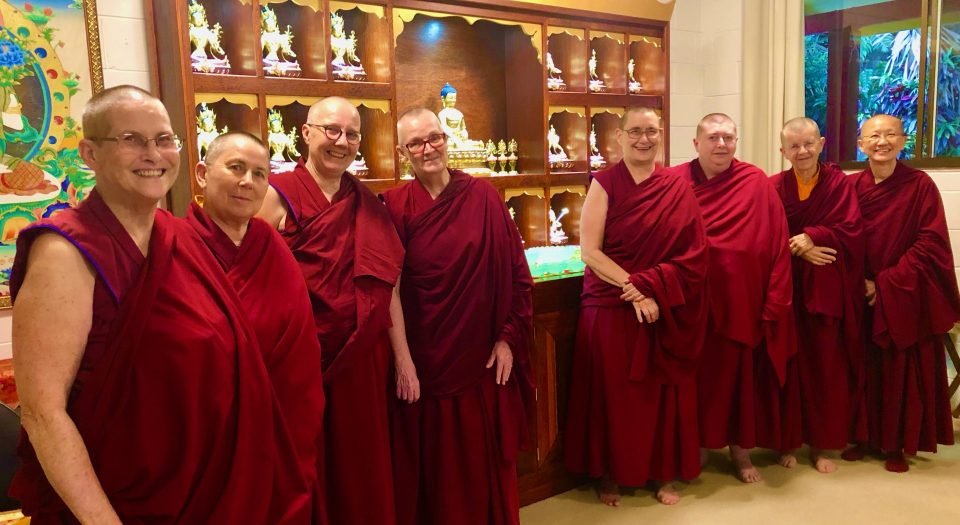
IMI Nuns, Chenreziig Institute, 2019.
Over the years the IMI has had many directors who had the honor to serve Rinpoche and fellow brothers and sisters. Among them are Nick Ribush, Marcels Bertels, Ven. Roger, Ven. Dondrub, Ven. Chantal (two times!), Ven. Tony, Monlam, Ven. Chodron, Ven. Carol, and currently Ven. Tendar. Drolkar McCallum has also served for over a decade as office manager. Over the years many monks and nuns have taken on the responsibilities of being board members, account holders, IMI representatives, or taken on specific jobs within the monastic communities.
We can rejoice that we were able to serve and contribute to the continuation of the Dharma on our planet. Rinpoche said: “The happiest thing in my life, most fulfilling thing is to work for and to benefit sentient beings. Even just the mere thought to cause happiness to sentient beings, to benefit them, to free them from suffering is the BEST offering to all the buddhas and bodhisattvas. This is the best offering, the best puja; this is what pleases their holy mind most”.
The IMI created the Lama Yeshe Sangha Fund (LYSF) in order to secure the basic conducive conditions (having food, shelter, medicine, and education) for its members. A review committee decides on the awarding of the grants. The IMI provides members with pre-ordination courses and has the ambition to extend and develop more material in this area.
Besides that, the IMI regularly organizes activities. At this moment, we have organized a continuous worldwide recitation in fulfilment of His Holiness’ advice for Lama Zopa Rinpoche’s quick return. You can sign up and join your Dharma brothers and sisters all over the world.
Support
As IMI members we are grateful to everyone who has supported us, some of you for decades. We hope that you continue or that you will consider supporting us. You can also read our latest annual report.
By supporting us you help to sustain the Sangha on this planet. There is a lot to rejoice about in terms of what has happened so far, but there are also instructions from Lama Zopa Rinpoche which have not been realized yet, like setting up a monastery in North America. And we have plans to create more levels of ordination courses as well.
Celebration
You are invited to join us on December 15 to listen to the talks of Khenrinpoche Geshe Chonyi from Kopan and later in the day Nick Ribush: https://imisangha.org/the-imi-turns-50/
We dedicate all our effort and energy to the long life of all our gurus and a quick return of Lama Zopa Rinpoche. May we always be able to serve them. May the Dharma flourish on this planet for a long time to come.
Please watch this recent video of Ven. Roger Kunsang sharing, as part of the 50th Anniversary Celebration, many intimate (and humorous!) stories about the early days of IMI coming into formation.
Foundation for the Preservation of Mahayana Tradition (FPMT), is a Tibetan Buddhist organization dedicated to the transmission of the Mahayana Buddhist tradition and values worldwide through teaching, meditation and community service.
- Tagged: imi, international mahayana institute
- Home
- News/Media
- Study & Practice
- About FPMT Education Services
- Latest News
- Programs
- New to Buddhism?
- Buddhist Mind Science: Activating Your Potential
- Heart Advice for Death and Dying
- Discovering Buddhism
- Living in the Path
- Exploring Buddhism
- FPMT Basic Program
- FPMT Masters Program
- FPMT In-Depth Meditation Training
- Maitripa College
- Lotsawa Rinchen Zangpo Translator Program
- Universal Education for Compassion & Wisdom
- Online Learning Center
- Prayers & Practice Materials
- Overview of Prayers & Practices
- Full Catalogue of Prayers & Practice Materials
- Explore Popular Topics
- Benefiting Animals
- Chenrezig Resources
- Death & Dying Resources
- Lama Chopa (Guru Puja)
- Lama Zopa Rinpoche: Compendium of Precious Instructions
- Lama Zopa Rinpoche: Life Practice Advice
- Lama Zopa Rinpoche Practice Series
- Lamrim Resources
- Mantras
- Prayer Book Updates
- Purification Practices
- Sutras
- Thought Transformation (Lojong)
- Audio Materials
- Dharma Dates – Tibetan Calendar
- Translation Services
- Publishing Services
- Teachings and Advice
- Find Teachings and Advice
- Lama Zopa Rinpoche Advice Page
- Lama Zopa Rinpoche: Compendium of Precious Instructions
- Lama Zopa Rinpoche Video Teachings
- ༧སྐྱབས་རྗེ་བཟོད་པ་རིན་པོ་ཆེ་མཆོག་ནས་སྩལ་བའི་བཀའ་སློབ་བརྙན་འཕྲིན།
- Podcasts
- Lama Yeshe Wisdom Archive
- Buddhism FAQ
- Dharma for Young People
- Resources on Holy Objects
- Ways to Offer Support
- Centers
- Teachers
- Projects
- Charitable Projects
- Make a Donation
- Applying for Grants
- News about Projects
- Other Projects within FPMT
- Support International Office
- Projects Photo Galleries
- Give Where Most Needed
- FPMT
- Shop
Translate*
*powered by Google TranslateTranslation of pages on fpmt.org is performed by Google Translate, a third party service which FPMT has no control over. The service provides automated computer translations that are only an approximation of the websites' original content. The translations should not be considered exact and only used as a rough guide.If you help others with sincere motivation and sincere concern, that will bring you more fortune, more friends, more smiles, and more success. If you forget about others’ rights and neglect others’ welfare, ultimately you will be very lonely.








